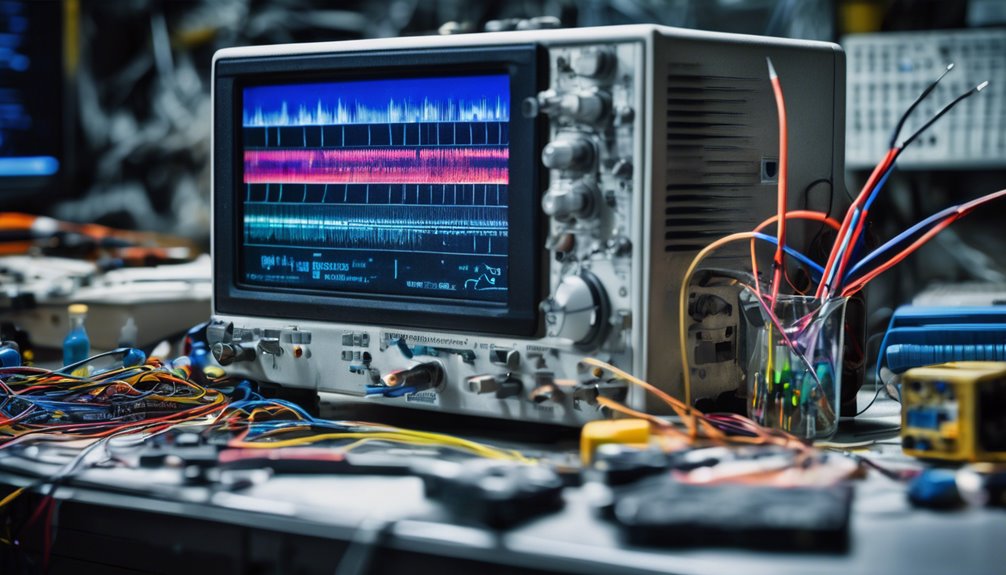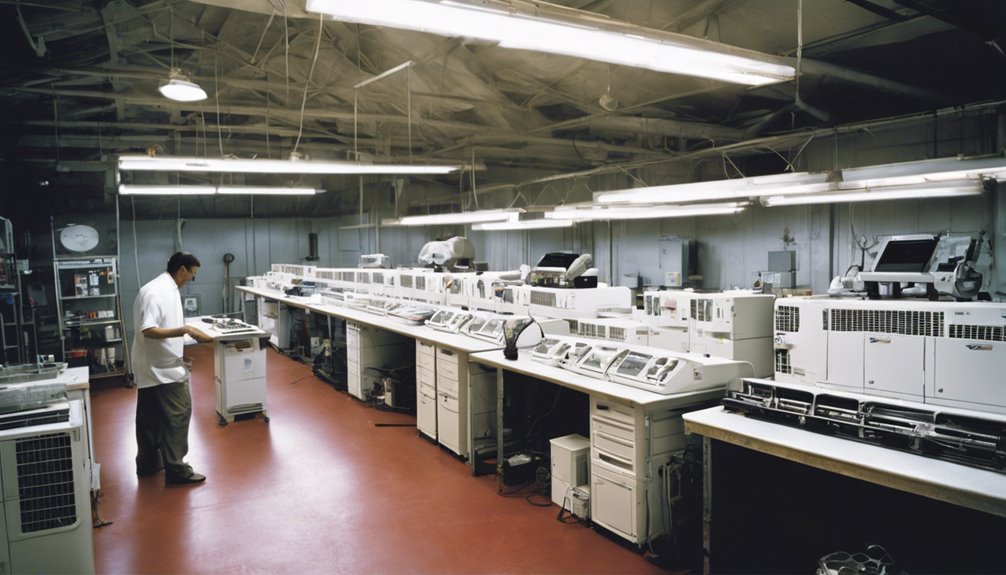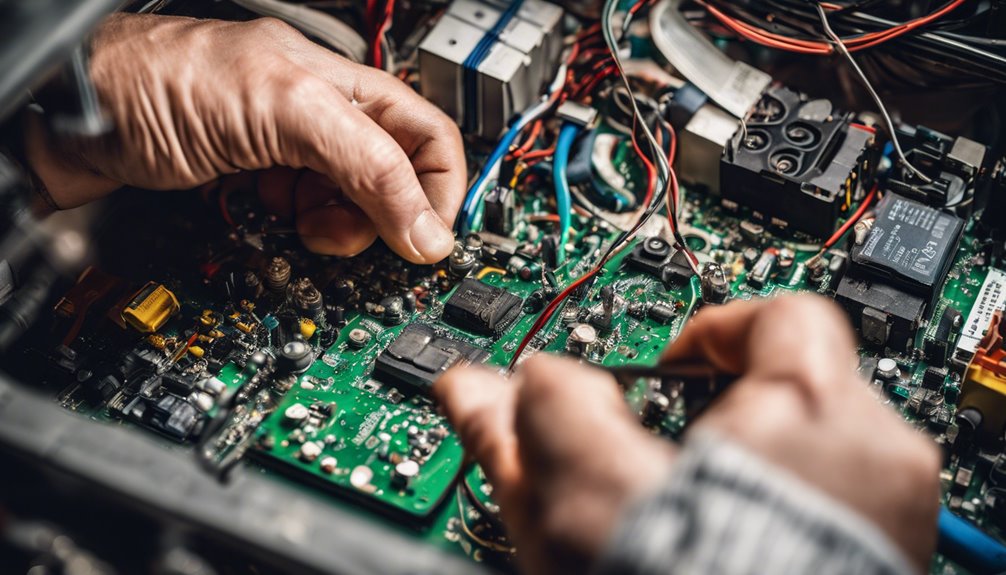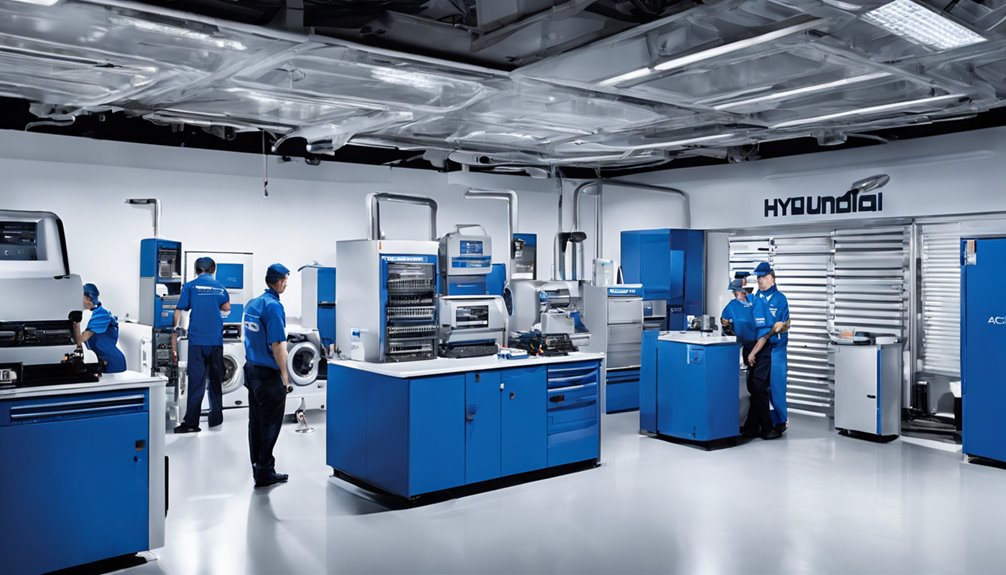To fix AC power fluctuation issues, start by identifying the source of the problem, checking your home's electrical system, and inspecting for faulty components. Check for loose connections, worn-out wires, and overloaded circuits, and measure voltage and current for unusual readings. If you're not comfortable DIY-ing, consider consulting a licensed electrician to assess your electrical system and provide a detailed report outlining necessary repairs or upgrades. By taking these steps, you'll be well on your way to resolving the issue and preventing future problems from arising.
Key Takeaways
- Identify the source of the problem by checking the power supply and distribution system for loose connections, worn-out wires, or overloaded circuits.
- Inspect your home's electrical system for balanced loads, overloaded circuits, and signs of wear, overheating, or corrosion on wiring and connections.
- Inspect and replace faulty components, such as capacitors, fuses, and circuit breakers, following proper safety protocols.
- Consider installing surge protectors and UPS systems to provide comprehensive protection and backup power during outages.
- Consult a licensed electrician if you're unsure about fixing the issue yourself, as they can identify and fix the root cause of the problem.
Identifying the Source of the Problem
When your AC power fluctuates, it's essential to identify the source of the problem to apply the right fix.
You can't just guess what's causing the issue and hope for the best. Power quality is critical, and voltage variations can have serious consequences on your appliances and devices.
Take a closer look at your power supply and distribution system to determine if it's the culprit. Check for loose connections, worn-out wires, or overloaded circuits.
You might also want to investigate if nearby construction or weather events are affecting your power quality. By pinpointing the root cause, you'll be able to take targeted action to resolve the issue and prevent future problems.
Checking Your Home's Electrical System
Your home's electrical system is the next suspect to investigate, as it's a common culprit behind AC power fluctuations. You'll want to check if your electrical load is balanced across different circuits. Unbalanced loads can cause voltage drops, leading to power fluctuations. Perform a circuit analysis to identify any overloaded circuits or faulty wiring.
| Circuit Analysis Steps | What to Look For |
|---|---|
| Check circuit breaker or fuse box | Tripped breakers or blown fuses |
| Inspect wiring and connections | Signs of wear, overheating, or corrosion |
| Measure voltage and current | Unusual readings or fluctuations |
| Identify high-power appliances | Overloaded circuits or inadequate wiring |
Inspecting and Replacing Faulty Components
If your circuit analysis reveals signs of wear, overheating, or corrosion, it's likely you've found the root cause of your AC power fluctuation issues.
Now it's time to inspect and replace faulty components. Start by testing capacitors, which can cause power fluctuations when they fail. Use a capacitor tester to identify any faulty ones.
Next, inspect other components like fuses, circuit breakers, and wiring for signs of wear or damage. Replace any faulty components you find, making sure to follow proper safety protocols.
Remember to turn off the main power supply before starting any repairs. By replacing faulty components, you'll be one step closer to resolving your AC power fluctuation issues.
Installing Surge Protectors and UPS Systems
Installing surge protectors and UPS systems is a crucial step in preventing AC power fluctuations. You'll want to consider whole house protection, which involves installing a surge protector at your main electrical panel. This will safeguard all your devices and appliances from power surges. Alternatively, you can use power strips with built-in surge protection for individual devices or groups of devices.
| Type | Purpose | Benefits |
|---|---|---|
| Whole House Surge Protector | Protects entire home from power surges | Comprehensive protection, easy installation |
| Power Strip with Surge Protection | Protects individual devices or groups | Portable, affordable, and convenient |
| UPS (Uninterruptible Power Supply) | Provides backup power during outages | Ensures continuous operation, data protection |
Consulting a Licensed Electrician
While addressing AC power fluctuation issues, it's essential to recognize the importance of professional expertise, especially when dealing with complex electrical systems.
You shouldn't hesitate to consult a licensed electrician who can identify and fix the root cause of the problem. When selecting an electrician, look for their qualifications, such as licenses, certifications, and experience.
Check their reputation online by reading reviews and asking for referrals from friends or family members. A reputable electrician will assess your electrical system, identify potential hazards, and provide a detailed report outlining the necessary repairs or upgrades.
Frequently Asked Questions
Can I Fix AC Power Fluctuation Issues on My Own?
You can try to fix AC power fluctuation issues on your own by monitoring voltage levels and performing circuit analysis to identify the root cause, but it's recommended to consult a professional if you're unsure or uncomfortable with the process.
Will a UPS System Protect My Devices From Power Surges?
You're wondering if a UPS system will safeguard your devices from power surges. Yes, it will! A UPS provides power backup and voltage regulation, ensuring your devices receive a stable power supply, even during surges or outages.
Can Power Fluctuations Damage My Home's Electrical System?
You're right to worry about power fluctuations damaging your home's electrical system. Voltage spikes can cause electrical wear, weakening your system over time, and potentially leading to costly repairs or even electrical fires if left unchecked.
Do Power Strips Provide Surge Protection for My Devices?
You're wondering if power strips safeguard your devices from voltage spikes. Yes, they do! Most power strips offer surge protection, shielding your gadgets from electrical storms and other power fluctuations that could damage them.
Will a Whole-House Surge Protector Affect My Electricity Bill?
You're wondering if a whole-house surge protector will hike your electricity bill. The good news is that it won't significantly impact your energy efficiency, and a cost analysis shows the protection it offers far outweighs any minor increase in cost.
Conclusion
You've taken the first steps to fixing AC power fluctuation issues in your home. By identifying the source, checking your electrical system, and replacing faulty components, you've addressed the root causes. Installing surge protectors and UPS systems provides an extra layer of protection. If you're still unsure, don't hesitate to consult a licensed electrician. With these steps, you'll be well on your way to enjoying stable and reliable power in your home.



